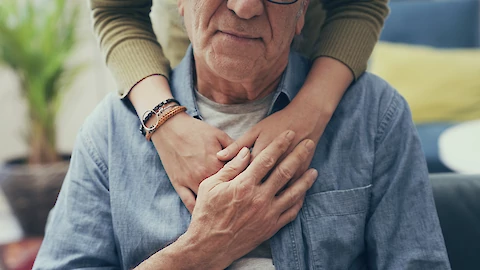
February marks American Heart Month, a time when we bring heightened awareness to heart health issues and the factors that influence it. One such factor, often overlooked, is the profound impact of grief on our physical heart health, especially for seniors.
Senior Helpers Danbury will explore the physiological effects of grief on the heart, focusing particularly on seniors who have recently experienced the loss of a spouse, family member, or dear friend. By understanding the relationship between grief and heart health, we can empower ourselves to take better care of our hearts during life's challenging times.
Understanding Grief
Grief is a profound and often debilitating emotional response to loss – especially the loss of a loved one. Almost everyone will experience grief at some point in their lives. For seniors who may have witnessed the passing of many friends and family members, grief can be a common, recurring experience. Grief affects more than just emotional or mental health; it can also have very real, tangible effects on physical health, particularly the health of the heart.
The Heart and Grief Connection
The connection between grief and heart health is so significant that it has given rise to a medical term known as Broken Heart Syndrome. Also known as stress-induced cardiomyopathy or Takotsubo cardiomyopathy, this condition mimics the symptoms of a heart attack. This is often triggered by intense emotional or physical stress, such as the death of a loved one.
Grief's Impact on Seniors' Heart Health
Seniors are particularly vulnerable to the damaging effects of grief on the heart. Aging bodies already fight an uphill battle against various health issues, including heart disease, and a severe emotional shock can add an extra burden on an already strained cardiovascular system.
Prolonged or chronic grief can lead to long-term heart health issues. This can include high blood pressure, arrhythmias, and even increased risk of heart attack. Thus, it is essential to manage grief to prevent it from exacerbating existing heart conditions or creating new ones.
Protecting Heart Health During Grief
It is difficult to control the experience of loss. However, there are ways seniors can protect their heart health during the grieving process. Here are a few options:
Professional Help
Do not hesitate to seek professional help. Therapists and grief counselors can provide emotional support and coping strategies. Social support networks, like friends, family, or support groups, can also play a crucial role in mitigating the stress of grief.
Maintain a Healthy Lifestyle
Try to maintain a healthy lifestyle. Regular physical activity, a balanced diet, and sufficient sleep can all contribute to heart health. However, remember to consult a healthcare professional before making significant changes to a senior's lifestyle.
Explore Your Feelings
Understanding feelings and finding healthy ways to express them can also be beneficial. Journaling, art, meditation, or just talking things out can help process the emotional turmoil of grief.
Senior Helpers Danbury Helps Seniors Navigate Their Grief
The grief-heart health connection may not be widely known, but it is crucial, particularly for seniors navigating through the loss of loved ones. Taking care of heart health during the grieving process is paramount. Whether it's reaching out to a professional, making healthy lifestyle changes, or finding a unique emotional outlet, every little step counts.
Are you residing in Danbury, New Milford, Newtown, Fairfield County, or Litchfield County? Senior Helpers Danbury is here to stand by your side. We provide professional, compassionate in-home services that support not just physical well-being but also emotional health. Contact us today.